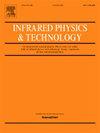利用高光谱成像和机器学习精确识别带壳山核桃和壳内山核桃的品种
IF 3.1
3区 物理与天体物理
Q2 INSTRUMENTS & INSTRUMENTATION
引用次数: 0
摘要
山核桃是人体必需的坚果,含有多不饱和脂肪酸和膳食纤维,对人体健康有益。山核桃以带壳和去壳两种形式出口和销售。然而,品种鉴定对生产商和加工商都是一个挑战,这导致为了经济利益而进行品种替代。本研究旨在调查可见近红外和近红外高光谱成像系统(HSI)在准确识别山核桃栽培品种(Cape fear、Desirable、Stuart blend 和 Sumner)方面的功效。使用波长分别为 400-1000 纳米和 900-1700 纳米的可见近红外和近红外高光谱成像系统采集了带壳和去壳光谱。使用主成分分析法(PCA)降低了光谱维度。然后,利用选定的主成分(PCs)建立六个机器学习分类器(决策树、随机森林、梯度提升、偏最小平方判别分析、支持向量机和线性判别分析(LDA)),进行四级分类。采用和不采用 PCA 的线性判别分析法对两种山核桃的分类准确率最高。对于带壳山核桃,不带 PCA 的 LDA 准确率为 90.59%,在 VNIR 光谱上使用 PCA 后准确率提高到 91.67%,而不带 PCA 的 LDA 准确率为 93.36%,在 NIR 光谱上使用 PCA 后准确率提高到 93.52%。对于带壳山核桃,不使用 PCA 的 LDA 在 VNIR 光谱上的准确率为 98.59%,使用 PCA 后准确率提高到 99.12%,而使用和不使用 PCA 的 LDA 在 NIR 光谱上的准确率均为 98.26%。此外,在波长选择和建模方面也采用了连续投影算法,结果令人满意。总体而言,壳内山核桃的准确度更高。这项研究揭示了恒星仪系统在鉴别山核桃品种方面的实用性。本文章由计算机程序翻译,如有差异,请以英文原文为准。
Precision variety identification of shelled and in-shell pecans using hyperspectral imaging with machine learning
Pecans are essential nuts containing polyunsaturated fatty acids and dietary fiber which offer health benefits to humans. They are exported and sold in both in-shell and shelled forms. However, varietal identification poses a challenge to both producers and processors, which results in variety substitution for economic advantages. The aim of this study was to investigate the efficacy of visible near-infrared (VNIR) and near-infrared (NIR) hyperspectral imaging systems (HSI) to accurately identify pecan cultivars (Cape fear, Desirable, Stuart blend, and Sumner). The in-shell and shelled spectra were acquired using VNIR and NIR-HSI at wavelengths 400–1000 nm and 900–1700 nm, respectively. The spectra dimensionality was reduced using principal component analysis (PCA). Thereafter, the selected principal components (PCs) were used to build six machine learning classifiers (Decision Tree, Random Forest, Gradient Boosting, Partial Least Square Discriminant Analysis, Support Vector Machine, and Linear Discriminant Analysis (LDA)) for four-class classification. LDA with and without PCA achieved the highest accuracy for both pecan forms. For shelled pecans, the LDA without PCA achieved 90.59 % and increased to 91.67 % accuracy with PCA on the VNIR spectra, while the LDA without PCA achieved 93.36 % and increased to 93.52 % accuracy with PCA on the NIR spectra. For the in-shell pecans, LDA without PCA achieved 98.59 % and increased to 99.12 % accuracy with PCA on the VNIR spectra, while LDA with and without PCA achieved 98.26 % accuracy for the NIR spectra. Moreover, Successive Projection Algorithm was also implemented for wavelength selection and modeling with satisfactory results. Overall, higher accuracy was achieved in the in-shell pecan. This study revealed the usefulness of HSI systems in identifying pecan varieties.
求助全文
通过发布文献求助,成功后即可免费获取论文全文。
去求助
来源期刊
CiteScore
5.70
自引率
12.10%
发文量
400
审稿时长
67 days
期刊介绍:
The Journal covers the entire field of infrared physics and technology: theory, experiment, application, devices and instrumentation. Infrared'' is defined as covering the near, mid and far infrared (terahertz) regions from 0.75um (750nm) to 1mm (300GHz.) Submissions in the 300GHz to 100GHz region may be accepted at the editors discretion if their content is relevant to shorter wavelengths. Submissions must be primarily concerned with and directly relevant to this spectral region.
Its core topics can be summarized as the generation, propagation and detection, of infrared radiation; the associated optics, materials and devices; and its use in all fields of science, industry, engineering and medicine.
Infrared techniques occur in many different fields, notably spectroscopy and interferometry; material characterization and processing; atmospheric physics, astronomy and space research. Scientific aspects include lasers, quantum optics, quantum electronics, image processing and semiconductor physics. Some important applications are medical diagnostics and treatment, industrial inspection and environmental monitoring.

 求助内容:
求助内容: 应助结果提醒方式:
应助结果提醒方式:


